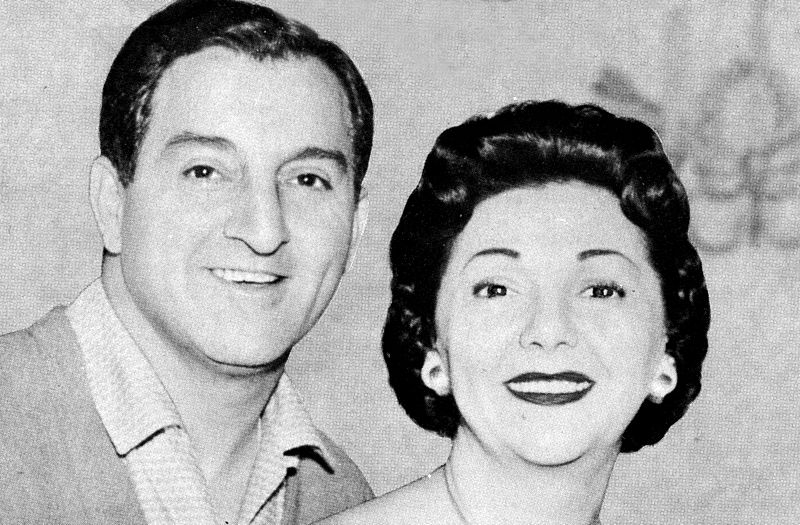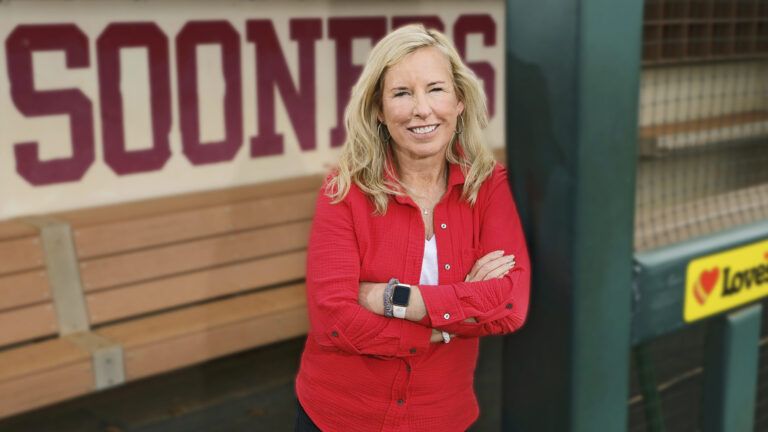It happened in Detroit in 1934. I was on “The Happy Hour Club” radio show when the announcer walked me over to the new singer, and said:
“Rosemarie, I’d like you to meet another singer, Amos Jacobs.”
His grin was boyish and uncertain. I liked it. Most of all I liked his eyes. They were bright with truth.
Two years later we were married.
Somewhere along the line he decided to change his name, so he took the first names of his two brothers and called himself Danny Thomas. Danny was a singer then, who later became a comedian—by accident.
In 24 years of marriage we have shared all the ups and downs of an actor’s life, and been blest with three children. Yes, we’ve had our quarrels, too, but underneath it all there has always been the abiding promise, “Till death do us part.”
It’s pretty hard for Saturday’s quarrel to go very far when you’re kneeling next to each other at mass the following Sunday; or when you eat in our dining room. For on the wall there’s a large mural, a mahogany carving of the Last Supper.
Our dining room table is U-shaped, so no one ever has his back to the picture.
Danny’s success on television has made it possible for him to keep a promise he made a long time ago, a promise to a saint named Jude. Looking back, it seems to me that the meeting between Danny and the Saint was inevitable…
Danny was born in Deerfield, Michigan, into a home of few material possessions, but one that had a wealth of love and mercy. Come to think of it, these are the real roots of our happiness today, not anything that came later.
He got these traits from his parents who were Lebanese. Danny’s father tried to raise dray horses in Deerfield, and didn’t do so well, and then they moved to Toledo, Ohio, where he tried to peddle dry goods, and didn’t do much better.
Danny’s mother was a woman of remarkable strength, of a simple and undeviating faith. She raised her daughter and eight sons on stories about the old country.
“In the old country,” she would say, “people were measured in only one way; either they had hearts and souls or they didn’t. Their wealth or lack of it, their power or their weaknesses were never mentioned. Such things didn’t matter.”
When Danny was ten he was selling candy in a theater. There the acting bug bit him.
By 16 he was a performer, a singer; at 18 he worked as a factory hand and as a night watchman so he could buy a new suit for a job on “The Happy Hour Club” radio show in Detroit. He hitchhiked his way there.
On that show he became known as “The Tin Horn Cavalier,” partly because he used a gas pipe and a funnel for his act, “Trumpet Impressions,” and partly, I suspect, because of his nose.
One night he was so broke he had to break a date with a girl, who became so furious that she wrote a letter to the radio station, asking:
“Is that his nose, or is he eating a banana?”
Danny read it over the air that night, and suddenly found himself a comedian. That brought him a few more theater jobs than before, but he still had to struggle.
Even after we were married and had our first child, he was earning only $35 a week—when he worked. He struggled, bitterly, trying to find his level. I begged him to quit this crazy, uncertain business, and get some kind of a job, any job, with a steady check.
I used to pray at night: “Dear Lord, let Danny open a grocery store, or anything that will be steady and keep him at home. You can have Danny Thomas, just let us have Amos Jacobs.”
On one of his blackest nights, when he was working in a small club, Sam (name changed for obvious reasons), an employee he knew, burst in on him like a wild man, raving about how St. Jude had cured his wife of cancer. Danny asked him who this Jude was.
Sam explained that Jude was really Judas Thaddeus and that he was one of the apostles, but was called Jude because they didn’t want to confuse him with that other Judas.
Sam went on to say that his wife was given up at the hospital, but that he knelt down on the marble floor at midnight and stayed there until dawn, asking St. Jude to intercede with God for her.
Just when the sun came up, the doctor walked out, lifted Sam up, and said: “I don’t know whom you’re talking to, but thank him, because things are happening that I can’t understand. I’ve called all the doctors over to see it. Whatever cancer there was is no longer there.”
Before Sam left, he pressed a card into Danny’s hand. It was a prayer to St. Jude. “Ask him to help you, Danny,” Sam said. “He helps all the helpless and hopeless.”
Confused and happy for his friend, Danny put the card in his pocket.
The next night Danny was passing a church, and stopped in. When he put his hand in his pocket to get something for an offering, Danny felt the card.
He knelt and had a long, friendly chat with Jude, and asked him if he thought God wanted him to go on trying to be a comedian or to give it up and open a grocery store.
Danny then promised that if God showed him which way to take, he would build a shrine for St. Jude where the helpless and hopeless could come when they wanted to pray.
Not long after this, Danny got his first important job: one week, for $50, at a small Chicago night club. He stayed there for two years. For the first 26 weeks he got a $10 raise every two weeks. Then he was offered a half-interest in the place.
When Danny went to church to give thanks for all this, he sat down for a moment to think, and next to him on the seat was a little pamphlet. On it was a prayer to St. Jude.
Danny felt good and bad at the same time; bad, that he had forgotten all about his promise to St. Jude, and good, that Jude had reminded him so gently about it.
Danny came home and told me that being a partner in a night club was no way to build a shrine to Jude, and that he had decided that the shrine was going to be a different thing, a research hospital to find cures for children’s diseases.
I said he was a religious fanatic, and he said, “Honey, I love you, but this I must do.”
It wasn’t long after this decision that Danny found his real place in the entertainment business; first in movies, then in television. Meanwhile he never quit on his promise.
After talking to the experts, he learned that one of the most practical locations for the shrine was in Memphis, Tennessee, next to the State University, because the medical college had the largest student body in the country and one of the best faculties.
He also learned that it would cost $2,000,000 just to build the hospital, not to mention maintaining it.
It took Danny over ten years to get most of it; by his own contributions, through endless benefits he played, and by raising it among all the Arabic-speaking people in America.
These people are of all faiths—Catholic, Protestant, Jewish, and Moslem—and they represent all walks of life, from plumbers to psychiatrists. But I believe it was the first time they had ever done something together, as an ethnic group, here in America.
On November 2, 1958, in Memphis, Tennessee, Danny dug up a spadeful of earth to break ground for the St. Jude Hospital Foundation. One friend has called it: “Danny’s house of thanks.” It will soon be open. The labs are already busy researching leukemia.
Part of that first spadeful of earth is encased in a jar in our living room. And Danny still carries in his pocket the thumb-worn card with the prayer to St. Jude on it.
For more inspiring stories, subscribe to Guideposts magazine.






